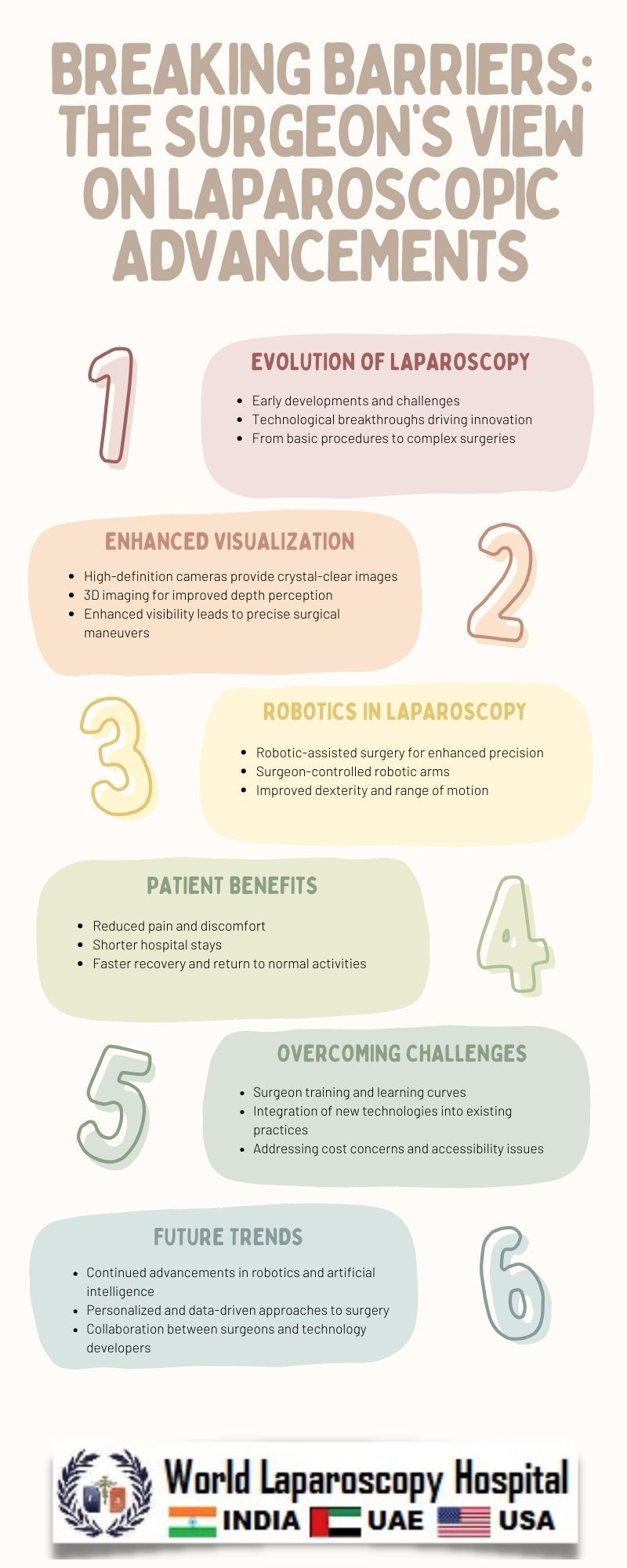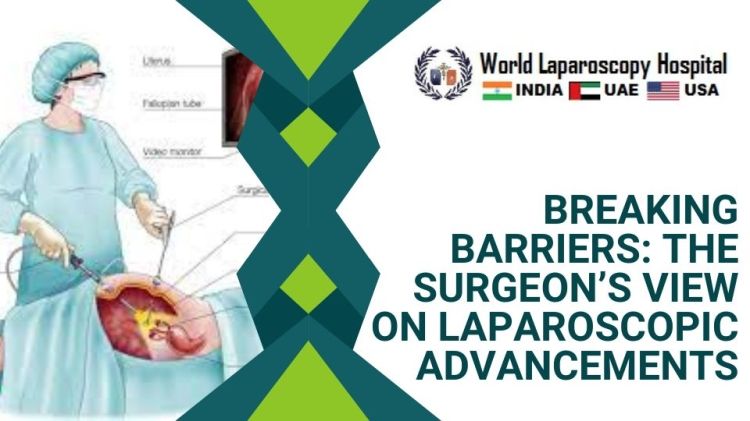Breaking Barriers: The Surgeon’s View on Laparoscopic Advancements
Introduction
Laparoscopic surgery has revolutionized the field of medicine, offering a less invasive alternative to traditional open surgeries. This paradigm shift has not only transformed the surgeon's approach but has also significantly improved patient outcomes. In this comprehensive exploration, we delve into the world of laparoscopic advancements from the perspective of surgeons, uncovering the groundbreaking developments, innovative techniques, and the transformative impact on the medical landscape.

The Evolution of Laparoscopic Surgery
Laparoscopic surgery, commonly known as minimally invasive surgery (MIS), has come a long way since its inception. Initially introduced in the 1980s, laparoscopy involved making small incisions through which a camera and surgical instruments were inserted. The real-time visualization provided by the camera allowed surgeons to perform intricate procedures with reduced trauma to the patient.
Over the years, advancements in technology have propelled laparoscopic surgery to new heights. High-definition cameras, improved instruments, and robotic-assisted systems have enhanced the precision and dexterity of surgeons, making minimally invasive procedures more widespread across various medical specialties.
The Surgeon's Perspective: Embracing Change
From the surgeon's viewpoint, the transition from traditional open surgery to laparoscopic techniques represents a fundamental shift in approach. Surgeons have had to adapt to new technologies, refine their skills, and embrace a mindset focused on continuous learning. The benefits, however, far outweigh the challenges.
One of the key advantages highlighted by surgeons is the reduced trauma to patients. Smaller incisions result in less postoperative pain, shorter hospital stays, and faster recovery times. Dr. Emily Martinez, a seasoned laparoscopic surgeon, emphasizes, "Patients are now able to return to their daily lives much sooner than with traditional surgeries. It's truly transformative."
Innovative Techniques Shaping the Future
As laparoscopic surgery continues to evolve, surgeons are pioneering innovative techniques that push the boundaries of what is possible. Single-incision laparoscopic surgery (SILS) is a notable example, where surgeons perform entire procedures through a single small incision, minimizing scarring and further reducing patient discomfort.
Dr. Jonathan Reynolds, a trailblazer in SILS, explains, "The goal is to make surgery as minimally invasive as possible. Single-incision techniques are challenging, but they offer a cosmetic advantage and potentially even quicker recovery times."
Beyond SILS, natural orifice transluminal endoscopic surgery (NOTES) represents another frontier. In NOTES, surgeons access the abdominal cavity through natural orifices such as the mouth or vagina, eliminating the need for external incisions altogether. While still in its experimental stages, NOTES holds promise for further minimizing the impact of surgery on patients.
Robotics in Laparoscopic Surgery
The integration of robotic systems into laparoscopic surgery has been a game-changer. Robotic-assisted surgery combines the precision of robotic arms with the expertise of the surgeon, allowing for more complex and delicate procedures. The da Vinci Surgical System, a widely adopted robotic platform, enables surgeons to perform intricate tasks with enhanced vision and control.
Dr. Michael Chen, a leading robotic surgeon, shares his experience, "Robotics have opened up new possibilities. The level of precision we can achieve is unparalleled, and the 3D visualization allows for a depth of field that was previously impossible."
Challenges and Future Directions
While laparoscopic surgery has transformed the medical landscape, challenges persist. The initial learning curve for surgeons adopting these techniques can be steep, and not all procedures are amenable to minimally invasive approaches. Additionally, the cost of acquiring and maintaining advanced laparoscopic technology, especially robotic systems, poses economic challenges for many healthcare institutions.
Looking ahead, surgeons and researchers are exploring ways to address these challenges and further refine laparoscopic techniques. Artificial intelligence (AI) is emerging as a potential ally, aiding in surgical planning, decision-making, and even enhancing the capabilities of robotic systems. The ongoing collaboration between surgeons, engineers, and data scientists holds the key to unlocking the full potential of laparoscopic surgery.
Patient-Centered Care in Laparoscopic Surgery
Beyond the technical aspects, laparoscopic surgery emphasizes patient-centered care. Surgeons are increasingly attuned to the psychological and emotional aspects of surgery, recognizing the impact it has on patients' lives. The reduced physical trauma, quicker recovery, and improved cosmetic outcomes contribute to an overall positive patient experience.
Dr. Sarah Thompson, a laparoscopic surgeon with a focus on patient advocacy, notes, "It's not just about the surgery itself; it's about how we can make the entire journey better for the patient. That includes education, communication, and ongoing support."
Conclusion
Breaking barriers in laparoscopic surgery is a testament to the relentless pursuit of excellence by surgeons and healthcare professionals. From its humble beginnings, laparoscopic surgery has evolved into a sophisticated field with the potential to transform the way we approach medical interventions.
The surgeon's view on laparoscopic advancements reflects a commitment to innovation, patient well-being, and a willingness to embrace change. As technology continues to advance and collaborative efforts between medical professionals and researchers flourish, the future of laparoscopic surgery holds even greater promise, ushering in an era where precision meets compassion in the operating room.






